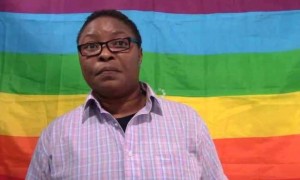
LONDON — For years, Anderonke Apata has been a fixture of the British LGBT activist scene, agitating for change and pushing for a larger share of the minority community’s stake in civil society. But last weekhttps://lgbtweekly.jeffjungblut.com/wp-admin/post.php?post=58676&action=edit Apata had her lengthy legal tussle to claim asylum in the country thrown out of the highest court of the land, the Royal Courts of Justice. Reporting from AllAfrica.com, reporter Tunde Oyedoyin, noted, “Apata, twice married and mother of two, was told by the judge that he would have to agree with the March 3 submissions of the State lawyer, Andrew Bird, who argued that the ruling and findings of the First Tier Tribunal (FTT) in 2012, are binding on the RCJ, because FTT is the one charged by Parliament with the jurisdiction to make fact findings and also equipped to do so by means of the facility to hear oral evidence and cross- examination.”
Apata remains a controversial candidate for repatriation, however. During the proceedings, it was learned that besides filing false reports on her sexuality – going so far as to produce a video trumpeting her lesbian – she also ‘subsisting’ in a relationship with an EEA national. She was not. The FTT concluded (paragraph 14) that “she overstayed, worked illegally and studied illegally.”
Furthermore, according to their report, “Despite claiming that she cannot bear to be in a relationship with a man, she has engaged in long-term relationships with Mr. Alima and Mr. Bamidele (both European nationals) and has declared her love and commitment to them openly in letters … ” She also claimed she was mentally ill as well as feared persecution.
The tightknit Nigerian LGBTQ community is of both binds, according to AllAfrica.com.
Mac-Iyalla, an openly gay Nigerian in London, said, “I have always known that asylum is not for everyone, but those who are honest and are at risks should be given protection.”
Black Pride’s lady Phyl Opoku, also spoke to The Guardian, but was of the view that Apata is, indeed, an activist. Of the ruling, she said, “this is very sad and disappointing,” because Apata ” has been graceful and very visible in our (LGBT) community.
Apata has much to fear. According to the 2014 Human Rights Risk Atlas, Nigeria, at 10, ranks in the bottom ten of the most unsafe countries in the world by human rights.











